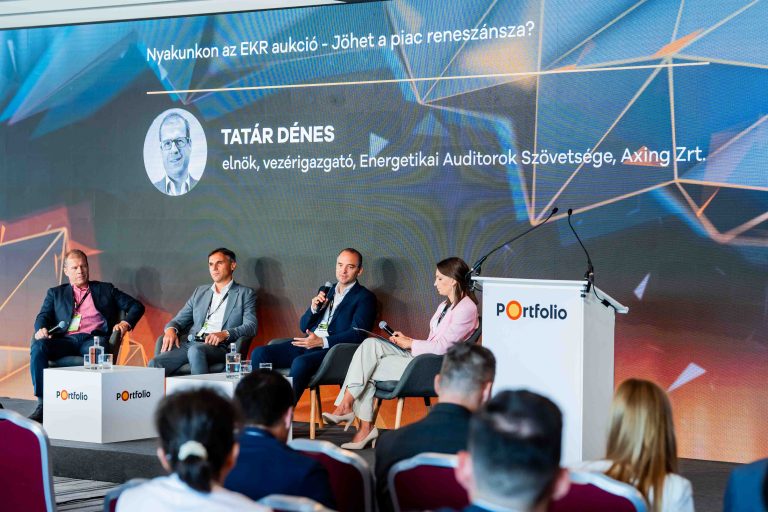On September 11, 2025, the key players in Hungary’s energy and sustainability sector gathered at the Portfolio Sustainable World Conference to discuss the most pressing issues affecting the industry. One of the main panels focused on the future of the Energy Efficiency Obligation System (EKR), where Dénes Tatár, CEO of Axing Zrt. and President of the Association of Energy Auditors (EASZ), laid out the most important insights and strategies for large companies. Prominent experts including Dániel Garai (CEO of CEEGEX) and Péter Kálmán (CEO of Óbuda Group) took part in the discussion, moderated by Bettina Baksa, ESG and Sustainability Lead of the UBM Group.
A New Era in the EKR: Focus on Residential Energy Efficiency
The panel’s main topicwas a recent wave of important legislative changes affecting the EKR. Dénes Tatár emphasized that legislators clearly intend to shift the system’s focus more toward improving residential building energy efficiency.
In practice, this means new categories have been created on the Certified Energy Savings (HEM) market. In the future, obligated parties—typically energy traders—will have to fulfill a significant portion of their obligations using HEMs originating from residential investments. This represents an entirely new situation in the market, as there are currently very few residential savings available for certification.
A high demand for these new types of residential HEMs is expected, which could fundamentally change the market logic.
Triple Challenge: Who Needs to Solve What?
These changes force all market players to rethink their strategies. Tatár identified three main groups facing serious challenges:
- Large industrial corporations – They ultimately finance the system through their energy bills but typically do not carry out residential energy efficiency projects themselves. They will need to procure the new residential HEMs from the marketplace in order to meet their obligations.
- Energy auditors – Firms like Axing have traditionally worked with large industrial clients. With the shift in focus, they must also prepare to certify a high volume of residential projects, which requires new processes and resources.
- Energy traders – Many have pre-stocked HEMs derived from the older, mostly industrial projects. These cannot satisfy the new residential-focused obligations, meaning their strategies must be completely rethought.
The Winning Strategy for Large Corporations – Three Recommendations from Dénes Tatár
To help large companies adapt to the changed environment, Dénes Tatár proposed a clear three-step strategy:
- Settlement using old HEMs – Companies should negotiate with their energy trader partners to use their previously acquired HEMs (even if their market value has dropped) to cover as much of their obligation as possible under the old rules.
- Procure residential savings – For the portion of the obligation now required to come from residential energy savings, companies must purchase the appropriate HEMs on the market.
- Plan for 2026 – A forward-looking strategy is essential. According to the regulation, savings from projects completed and certified in 2026 will gain significantly in value. Companies that start energy efficiency investments now, with the expectation of completing and certifying them by 2026, stand to obtain very valuable HEMs. Entering into preliminary agreements with obligated parties now may allow firms to capitalize on market expectations.
What Prices Are Expected at the September Auction?
Regarding the upcoming EKR auction on September 23, Dénes Tatár stated that precise price predictions are difficult, but the logic is clear. Due to large supply and limited demand for the old‐type HEMs, price increases are not expected in that market. On the other hand, for the new residential HEMs, the law already sets a reference value: 11,705 HUF/GJ has been determined as the minimum mandatory compensation for savings from residential consumers.
This figure can serve as a baseline or minimum price around which auction prices are likely to form.
Conclusion: Obligation Becomes Opportunity
The Portfolio conference reinforced the significant role of Axing Zrt. and Dénes Tatár in shaping the market. Although the transformation of the EKR presents substantial challenges for companies, with the right strategy and foresight, the obligations can once again become both a financial asset and a strategic opportunity. Axing remains committed to being a market-leading partner for its clients in navigating this transition.
